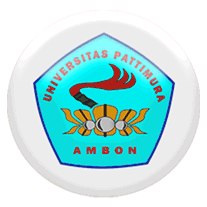COMPARISON OF B-SPLINE AND TRUNCATED SPLINE REGRESSION MODELS FOR TEMPERATURE FORECAST
Abstract
The spline regression model is a nonparametric model and it is applied to data that do not have a certain curve shape and do not have information about it. In this study, the results of the analysis of the B-Spline regression model and the Spline Truncated model were compared on temperature data at several stations on Java Island to obtain the best model that can be used to forecast the temperature for the next few days. Daily temperature data were obtained from BMKG at Semarang, Juanda, Serang, Sleman, Bandung, and Kemayoran stations. The temperature data were modeled with the B-Spline and Spline Truncated regression using the optimal knot point of the GCV, and the best model was obtained. The analysis shows that the B-Spline regression models are better than the truncated Spline models with a fairly small MSE value and a greater coefficient of determination than the truncated Spline model.
Downloads
References
M.K. Alomar, F. Khaleel, M. M. Aljumaily, A. Masood, S. F. M. Razali, M. A. AlSaadi, N. Al-Ansari, and M. M. Hameed, “Data-driven Models for Atmospheric Air Temperature Forecasting at a Continental Climate Region,” JPlos ONE, vol. 17, no. 11, 2022, [Online]. Available: https://doi.org/10.1371/journal.pone.0277079
R.J. Vidmar, “On the Use of Atmospheric Pressure Plasmas as Electromagnetic Reflectors and Absorbers,” IEEE Trans Plasma Sci, vol. 18, no. 4, pp. 733–741, 1990.
O. A. Dombayci and M. Golcu, “Daily Means Ambient Temperature Prediction Using Artificial Neural Network Method: A Case Study of Turkey,” Renew Energy, vol. 34, no. 4, pp. 1158–1161, 2009.
X. Li, Z. Li, W. Huang, and P. Zhou, “Performance of Statistical and Machine Learning Ensembles for Daily Temperature Downscaling,” Theor Appl Clim., vol. 140, no. 1, pp. 571–588, 2020.
I. Park, H. S. Kim, J. Lee, J. H. Kim, C. H. Song, and H. K. Kim, “Temperature Prediction Using the Missing Data Refinement Model Based on a Long Short-Term Memory Neural Network,” Atmosphere, vol. 10, no. 11, 2019.
B.A Smith, G. Hoogenboom, and R.W. McClendon, “Artificial Neural Networks for Automated Year-round Temperature Prediction,” Comput Electron Agric, vol. 68, no. 1, pp. 52–61, 2009.
A. Arif, “Mitigasi Peningkatan Curah Hujan,” Kompas, May 31, 2022. [Online]. Available: https://www.kompas.id/baca/ilmu-pengetahuan-teknologi/2022/05/30/mitigasi-peningkatan-curah-hujan
R.K. Kaufmann, H. Kauppi, M.L. Mann, and J.H. Stock, “Reconciling Anthropogenic Climate Change with Observed Temperature 1998–2008,” Proc Natl Acad Sci, vol. 108, no. 29, pp. 11790–11793, 2011.
D.A Stone and M.R. Allen, “Attribution of Global Surface Warming Without Dynamical Models,” Geophys Ress Lett, vol. 32, no. 18, 2005, [Online]. Available: https://doi.org/10.1029/2005GL023682
D.H. Douglass, E.G Blacman, and R.S Knox, “Temperature Response of Earth to the Annual Solar Irradiance Cycle,” Phys Lett A, vol. 323, no. 3, pp. 315–322, 2004.
M. Afzali, A. Afzali, and G. Zahedi, “The Potential of Artificial Neural Network Technique in Daily and Monthly Ambient Air Temperature Prediction,” Int J Env. Sci Dev, vol. 3, no. 1, pp. 33–38, 2012.
W. Hardle, Applied Nonparametric Regression. New York: Cambridge University Press, 1990.
I.N. Budiantara, Spline Dalam Regresi Nonparametrik dan Semiparametrik: Sebuah Pemodelan Statistika Masa Kini dan Masa Mendatang, Pidato Pengukuhan Untuk Jabatan Guru Besar Dalam Bidang Ilmu Matematika Statistika Dan Probabilitas, Pada Jurusan Statistika, Fakultas MIPA, Institut Teknologi Sepuluh Nopember. Surabaya: ITS Press, 2009.
R.L. Eubank, Nonparametric Regression and Spline Smoothing. New York: Marcel Dekker Inc., 1999.
T.Lyche and K. Morken, Spline Methods Draft. 2004.
M. Kaseside and S.B. Loklomin, “Analisis Angka Kematian Bayi di Kabupaten Halmahera Utara dengan Metode Regresi Nonparametrik Spline Truncated,” Variance, vol. 3, no. 1, pp. 1–5, 2021.
R.E.Caraka and A.R. Devi, “Application Of Non Parametric Basis Spline (B-SPLINE) In Temperature Forecasting,” J. Stat., vol. 4, no. 2, pp. 68–74, 2016.
G. Farin, Curves and Surfaces for CAGD A Practical Guide, Fifth. United States of America: Academic Press, 2002.
G. Wahba, “Spline Models for Observational Data,” CBMS-NSF Reg. Conf. Ser. Appl. Math., vol. 59, 1990.
D. Fitriana, “Pengujian Hipotesis Parsial Pada Regresi Semiparametrik Spline Truncated (Aplikasi Data Angka Harapan Hidup di Indonesia,” Institut Teknologi Sepuluh November, Surabaya, 2017.
P.S. Carmack, J.S. Spence, and W.R. Schucany, “Generalised correlated cross-validation,” J. Nonparametric Stat., vol. 24, no. 2, pp. 269–282, 2012.
A.A.R. Fernandes, I N. Budiantara, B.W. Otok, and Suhartono, “Spline Estimator for Bi-Response and Multi-Predictors Nonparametric Regression Model in Case of Longitudinal Data,” J. Math. Stat., vol. 11, no. 2, pp. 61–69, 2015.
A.P. Sugiantari and I N. Budiantara, “Analisis Faktor-faktor yang Mempengaruhi Angka Harapan Hidup di Jawa Timur Menggunakan Regresi Semiparametrik Spline,” J. Sains Dan Seni ITS, vol. 2, no. 1, pp. 37–41, 2013.
A. Tripena and I N. Budiantara, “Fourier Estimator in Nonparametric Regression,” in International Conference On Natural and Applied Natural Scienes. Ahmad Dahlan Universiti, 2006.
D. N. Gujarati and D. C. Porter, Basic Econometrics 4th Edition. Graw Hill, New York, 2004.
N. R. Draper and H. Smith, Analisis Regresi Terapan Ekonomi, Edisi Kedu. PT Gramedia Pustaka Utama, Jakarta, 1992.
Copyright (c) 2023 Sri Sulistijowati Handajani, Hasih Pratiwi, Respatiwulan Respatiwulan, Niswatul Qona’ah, Monica Ramadhania, Niken Evitasi, Nindya Eka Apsari

This work is licensed under a Creative Commons Attribution-ShareAlike 4.0 International License.
Authors who publish with this Journal agree to the following terms:
- Author retain copyright and grant the journal right of first publication with the work simultaneously licensed under a creative commons attribution license that allow others to share the work within an acknowledgement of the work’s authorship and initial publication of this journal.
- Authors are able to enter into separate, additional contractual arrangement for the non-exclusive distribution of the journal’s published version of the work (e.g. acknowledgement of its initial publication in this journal).
- Authors are permitted and encouraged to post their work online (e.g. in institutional repositories or on their websites) prior to and during the submission process, as it can lead to productive exchanges, as well as earlier and greater citation of published works.






1.gif)



